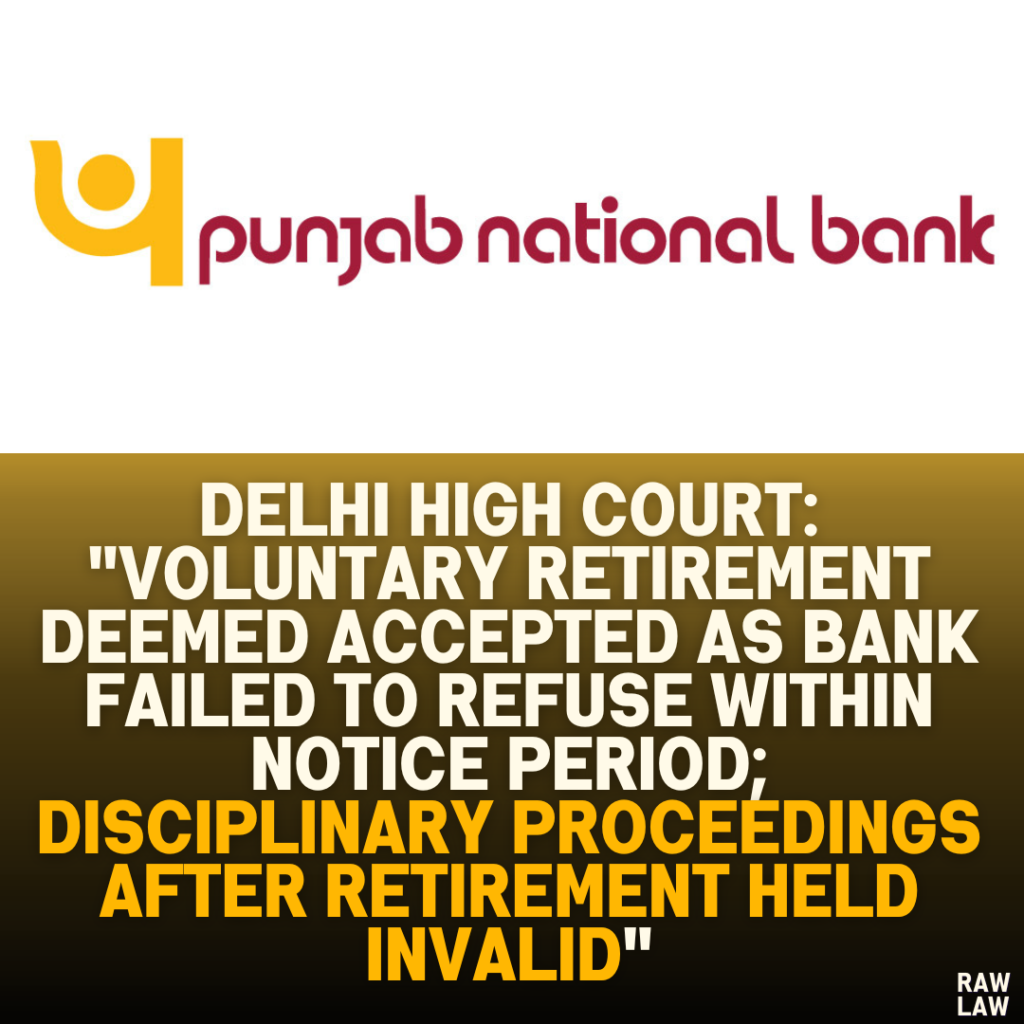Court’s Decision
The Delhi High Court ruled in favor of the appellant, holding that his voluntary retirement under Regulation 29(2) of the Punjab National Bank (Pension) Regulations, 1995, became effective after the three-month notice period expired. Since the respondent bank did not explicitly communicate a refusal, the retirement was deemed accepted. Consequently:
- Disciplinary proceedings initiated after the effective retirement date were invalid.
- The appellant was entitled to all benefits from his retirement date.
Facts
- Employment Details:
- The appellant joined the bank in 1973 and rose to the position of Chief Manager by 1984.
- In 1996, he was working as Chief Public Relations & Publicity Officer at the bank’s headquarters.
- Voluntary Retirement Notice:
- On 15.04.1998, the appellant submitted a notice under Regulation 29(1) & (2), seeking voluntary retirement effective 13.07.1998.
- Bank’s Response:
- On 04.05.1998, the bank stated that the appellant’s request would be considered after consulting the CBI regarding an ongoing investigation involving him.
- Appellant’s Belief:
- The appellant presumed he was retired after 13.07.1998, based on Regulation 29(2), since no explicit refusal had been communicated by the bank.
- He ceased reporting to work, believing his retirement was effective.
- Disciplinary Proceedings:
- The bank initiated disciplinary action against the appellant for unauthorized absence and subsequently removed him from service on 18.08.2000.
- Legal Challenge:
- The appellant challenged the dismissal before a Single Judge of the Delhi High Court, who upheld the bank’s decision. Aggrieved, he filed this appeal.
Issues
- Was the appellant’s voluntary retirement effective due to the bank’s failure to explicitly refuse it within the notice period?
- Were the disciplinary proceedings and subsequent dismissal valid, considering the effective date of retirement?
Petitioner’s Arguments
- Effectiveness of Retirement:
- Under Regulation 29(2), if the appointing authority does not refuse a voluntary retirement request before the notice period expires, the retirement is deemed accepted.
- The bank’s letter dated 04.05.1998 merely deferred the decision but did not constitute a refusal.
- Invalid Disciplinary Action:
- The disciplinary proceedings initiated after the effective retirement date (13.07.1998) were void, as the appellant was no longer in service.
- Precedent:
- Relied on J.P. Sharma v. Director General Border Roads, where similar provisions were interpreted to hold that silence amounts to acceptance.
Respondent’s Arguments
- Requirement of Explicit Acceptance:
- Regulation 29(2) necessitates explicit acceptance by the appointing authority for retirement to take effect.
- Silence or inaction cannot be equated with approval.
- Pending CBI Investigation:
- The appellant’s voluntary retirement request could not be considered due to a pending CBI investigation, which was valid grounds for delaying the decision.
- Appellant’s Conduct:
- The appellant’s presumption of deemed retirement was unreasonable, and his failure to report to work constituted misconduct justifying disciplinary proceedings.
Analysis of the Law
Regulation 29(2) of the PNB (Pension) Regulations:
- Text: It mandates that a notice of voluntary retirement requires acceptance by the appointing authority. However, the proviso clarifies that:
- If the authority does not explicitly refuse the request before the expiry of the notice period, the retirement becomes effective by default.
Court’s Findings:
- Interpretation of Regulation 29(2):
- The proviso to Regulation 29(2) protects employees by ensuring that silence or inaction by the employer results in deemed acceptance of retirement.
- The bank’s letter dated 04.05.1998 did not explicitly refuse the appellant’s retirement request. Instead, it deferred the decision pending the CBI’s response, which was insufficient to constitute a valid refusal.
- Precedent:
- The court relied on J.P. Sharma v. Director General Border Roads, where similar provisions were interpreted to hold that:
- If the appointing authority does not communicate refusal within the notice period, retirement is deemed effective.
- The court relied on J.P. Sharma v. Director General Border Roads, where similar provisions were interpreted to hold that:
- Disciplinary Proceedings:
- The court held that disciplinary proceedings initiated after the appellant’s deemed retirement date (13.07.1998) were invalid as the appellant was no longer in service.
Precedent Analysis
- J.P. Sharma v. Director General Border Roads:
- Held that failure to communicate refusal of a voluntary retirement request within the notice period results in deemed acceptance.
- The court found this precedent applicable, as Regulation 29(2) closely mirrors the provisions analyzed in J.P. Sharma.
- Other Cited Cases:
- Similar principles regarding the effectiveness of retirement in the absence of explicit refusal were reaffirmed.
Court’s Reasoning
- The appellant fulfilled the requirements of Regulation 29(1) by serving a three-month notice.
- The bank failed to communicate a refusal or clear decision within the stipulated notice period.
- The appellant’s reliance on the proviso to Regulation 29(2) was reasonable.
- Disciplinary action initiated after the effective retirement date was unauthorized and unsustainable in law.
Conclusion
The Delhi High Court:
- Quashed the disciplinary proceedings and subsequent removal from service.
- Declared the appellant’s voluntary retirement effective from 13.07.1998.
- Directed the bank to provide all consequential retirement benefits.
Implications
- The judgment underscores the importance of timely communication by employers regarding voluntary retirement requests.
- It clarifies that silence or inaction by the appointing authority leads to deemed acceptance under similar regulatory frameworks.
- The ruling protects employees from unwarranted disciplinary actions initiated after their deemed retirement.




Pingback: Delhi High Court Enforces Father’s Visitation Rights Amid Allegations of Parental Alienation, Emphasizing Child’s Welfare as Paramount in Custody Dispute - Raw Law